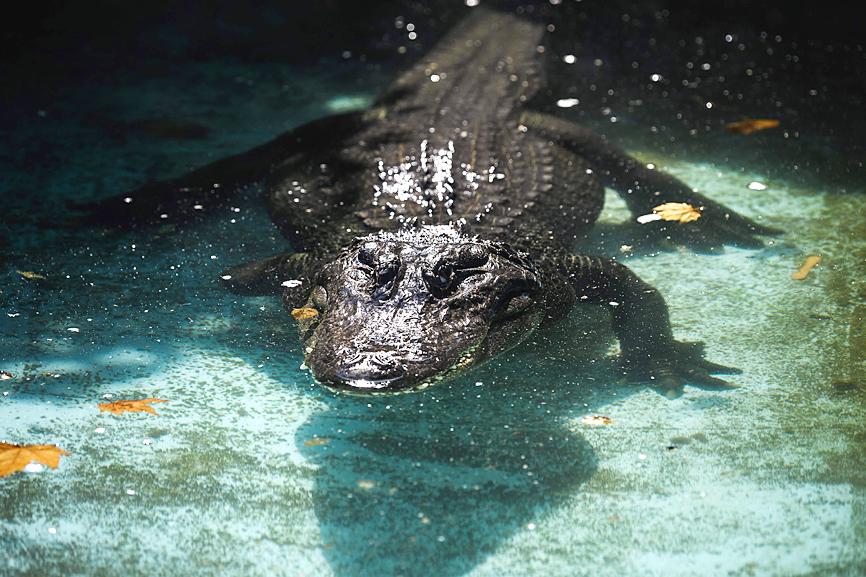Muja has lived through multiple bombing campaigns and several countries all while never leaving a tiny pool in the Belgrade Zoo for 83 years, making him the world’s oldest captive alligator.
While zookeepers do not know his exact hatch day, the reptile arrived in Belgrade in August 1937 from a German zoo.
“He’s an older gentleman and we respect his age,” Jozef Edvedj, the zoo’s veterinarian, told reporters with a smile after handlers helped guide a dead rat to the jaws of the slow-moving reptile.

Photo: AFP
He officially became the world’s oldest captive alligator when Moscow Zoo’s Saturn, who was born in 1936, died in May.
According to news reports from 1937, Muja was two years old when he arrived in Belgrade, a year after the zoo opened.
However, in photographs from the reports, he appears older, leading zookeepers to believe that he is over 90 now.
While Muja has not seen much outside his shallow and spartan 12m by 7m pool, he survived bombings during World War II that killed many animals in the zoo, along with six zookeepers.
The ’gator arrived in Belgrade when it was still the capital of the Kingdom of Yugoslavia.
He lived through the country’s socialist era and the bloody breakup of Yugoslavia, which ended in yet another bombing campaign, carried out by NATO in 1999.
Muja is still in “good health for his age,” and the only time the veterinarians were seriously concerned was in 2012, when he had to have a right claw amputated due to gangrene.
“The surgery was very difficult, but successful. Muja recovered and adjusted to a new lifestyle,” Edvedj said.
Due to his advanced age, Muja does not move much, but becomes snappy during feeding time, which comes only once or twice a month.
These days, he often needs a bit of help finding his “prey,” which zookeepers place right in front of his jaws.
“I genuinely hope that we could celebrate his 100th birthday, as I believe he could live comfortably for another 15-20 years,” the veterinarian said.

Nauru has started selling passports to fund climate action, but is so far struggling to attract new citizens to the low-lying, largely barren island in the Pacific Ocean. Nauru, one of the world’s smallest nations, has a novel plan to fund its fight against climate change by selling so-called “Golden Passports.” Selling for US$105,000 each, Nauru plans to drum up more than US$5 million in the first year of the “climate resilience citizenship” program. Almost six months after the scheme opened in February, Nauru has so far approved just six applications — covering two families and four individuals. Despite the slow start —

North Korean troops have started removing propaganda loudspeakers used to blare unsettling noises along the border, South Korea’s military said on Saturday, days after Seoul’s new administration dismantled ones on its side of the frontier. The two countries had already halted propaganda broadcasts along the demilitarized zone, Seoul’s military said in June after the election of South Korean President Lee Jae-myung, who is seeking to ease tensions with Pyongyang. The South Korean Ministry of National Defense on Monday last week said it had begun removing loudspeakers from its side of the border as “a practical measure aimed at helping ease

MOGAMI-CLASS FRIGATES: The deal is a ‘big step toward elevating national security cooperation with Australia, which is our special strategic partner,’ a Japanese official said Australia is to upgrade its navy with 11 Mogami-class frigates built by Japan’s Mitsubishi Heavy Industries, Australian Minister for Defence Richard Marles said yesterday. Billed as Japan’s biggest defense export deal since World War II, Australia is to pay US$6 billion over the next 10 years to acquire the fleet of stealth frigates. Australia is in the midst of a major military restructure, bolstering its navy with long-range firepower in an effort to deter China. It is striving to expand its fleet of major warships from 11 to 26 over the next decade. “This is clearly the biggest defense-industry agreement that has ever

DEADLY TASTE TEST: Erin Patterson tried to kill her estranged husband three times, police said in one of the major claims not heard during her initial trial Australia’s recently convicted mushroom murderer also tried to poison her husband with bolognese pasta and chicken korma curry, according to testimony aired yesterday after a suppression order lapsed. Home cook Erin Patterson was found guilty last month of murdering her husband’s parents and elderly aunt in 2023, lacing their beef Wellington lunch with lethal death cap mushrooms. A series of potentially damning allegations about Patterson’s behavior in the lead-up to the meal were withheld from the jury to give the mother-of-two a fair trial. Supreme Court Justice Christopher Beale yesterday rejected an application to keep these allegations secret. Patterson tried to kill her